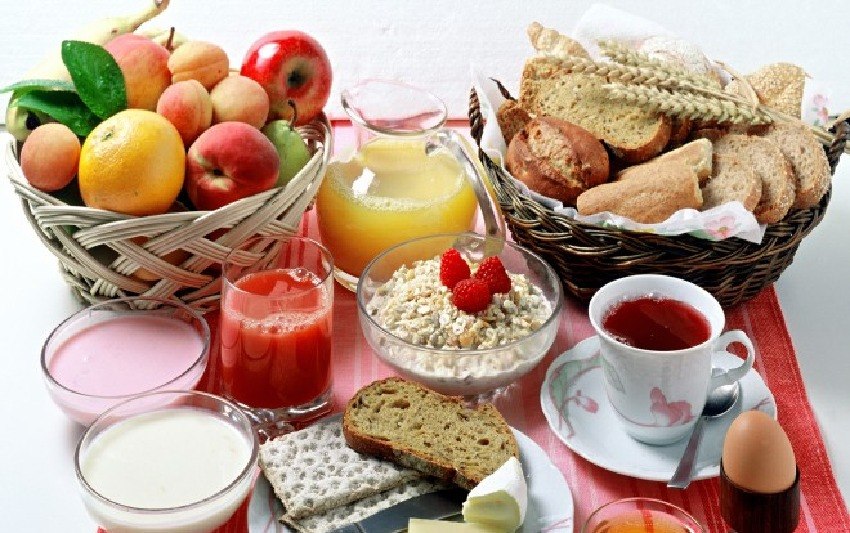The Best Foods to Eat for Breakfast
 Health & Fitness
Health & Fitness
Start your day off right
The next time you rush out the door in the morning without something to eat, consider this: Skipping breakfast can set you up for overeating later in the day. A healthy a.m. meal, on the other hand, can give you energy, satisfy your appetite, and set the stage for smart decisions all day long.
"You want to aim for a breakfast that combines good carbs and fiber with some protein," says Erica Giovinazzo, MS, RD, a nutritionist at Clay Health Club and Spa, in New York City. Luckily, your options are plenty. Here's a look at some of our favorite breakfast foods, along with expert tips for making them even healthier.
Oatmeal
You may have noticed a heart-shaped seal on your box of oatmeal recently. The seal's there because oats contain beta-glucan, a type of fiber that's been shown to help lower cholesterol when eaten regularly. Need another reason to dig in? Oats are also rich in omega-3 fatty acids, folate, and potassium.
Steel-cut oats, which take about 15 minutes to cook, contain more fiber than rolled oats or instant varieties, but any type of oatmeal is a healthy choice. Just avoid the flavored kinds, which can be packed with sugar. Instead, sweeten your bowl with milk and a bit of honey, and top with fruit and nuts.
Greek yogurt
This tangy, creamy yogurt is loaded with calcium and boasts plenty of protein—nearly twice as much as regular yogurt—to keep you feeling full throughout the morning. Your best bet: Choose a plain, nonfat variety, and add some fruit to give it some sweetness and flavor (and a dose of added nutrition).
"I love Greek yogurt because it's really quick and easy," Giovinazzo says. "You can always take it with you on your way out the door."
Wheat germ
A little wheat germ goes a long way. Just two tablespoons provides about 15% of your recommended daily intake of vitamin E and 10% of your daily folate. "Vitamin E is often a little low in people's diets, so this is a good way to add in some extra—especially if you don't eat a lot of nuts or seeds, two other big sources," Giovinazzo says.
It's easy to incorporate wheat germ into almost any meal, including your go-to breakfasts: Sprinkle it over cereal, stir it into yogurt, or mix it into a smoothie.
Grapefruit
Trying to lose weight? According to one study, eating half a grapefruit before each meal may help you slim down faster, thanks to the fruit's fat-burning properties and its beneficial effect on blood sugar and insulin levels. Grapefruit is also hydrating, filling, and packed with immunity-boosting antioxidants.
For a well-rounded breakfast, pair it with protein—such as yogurt or an egg, Giovinazzo suggests. But check with your doctor first if you take any medications, as grapefruit and grapefruit juice can interfere with some prescription drugs.
Bananas
There's nothing like a banana at breakfast to keep those mid-morning cravings at bay. The yellow fruit—especially when they're still a touch green—are one of the best sources of resistant starch, a healthy carbohydrate that keeps you feeling fuller longer.
"Slice it up and add it to cereal or oatmeal," Giovinazzo suggests. "It will add natural sweetness, so you may not need additional sugar."
Thanks to a healthy dose of potassium, an electrolyte that helps lower blood pressure naturally, bananas are a particularly good choice for people with hypertension.
Eggs
These incredible edibles have made quite a comeback in recent years. Once shunned for being high in dietary cholesterol (one yolk contains about 60% of your daily allotment), eggs are now embraced as a healthy source of protein and nutrients like vitamin D. Why the turnabout? Research has shown that the cholesterol in our food has less of an impact on blood cholesterol than previously thought.
Almond butter
Don't eat eggs or dairy? Almond butter is an excellent alternate source of protein, and it's filled with monounsaturated fat (one of the good fats). Plus, as Giovinazzo points out, "it's really delicious spread on whole grain bread or paired with a banana or an apple."
Nutritionally, almond butter is comparable to peanut butter, and they each have about 100 calories per tablespoon. Almond butter contains slightly less saturated fat, though—a definite point in its favor, even for people who aren't allergic to peanuts.
Watermelon
As its name suggests, watermelon is an excellent way to hydrate in the morning. What's less well known is this juicy fruit is among the best sources of lycopene—a nutrient found in red fruits and vegetables that's important for vision, heart health, and cancer prevention.
Best of all, watermelon contains just 40 calories per cup, landing it on lists of so-called negative-calorie foods that supposedly burn more calories during digestion than they add in. (Actually, it's a bit more complicated than that, but that's no reason to not eat watermelon!)
Flaxseed
Sprinkling ground flaxseed into a smoothie or bowl of cereal will turn your breakfast into a gold mine of omega-3 fatty acids; just two tablespoons contains more than 100% of your recommended daily intake for those heart-healthy fats. Flaxseed, which has a nutty flavor, also is rich in fiber and lignan, an antioxidant that's been shown to protect against breast cancer.
A word of caution: Whole flaxseeds will pass through your body without being digested, so be sure to buy them ground or grind them yourself with a coffee or spice grinder.
Blueberries
Fresh or frozen, these tiny superfruits pack a big antioxidant punch. Or better yet, a flurry of punches: Studies suggest that eating blueberries regularly can help improve everything from memory and motor skills to blood pressure and metabolism. (Wild blueberries, in particular, have one of the highest concentrations of the powerful antioxidants known as anthocyanins.)
Blueberries are also lower in calories than a lot of other fruits (they contain just 80 per cup), so you can pile them onto your cereal without worrying about your waistline.
Strawberries
"Berries are superfoods because they're so high in antioxidants without being high in calories," Giovinazzo says. One cup of strawberries, for instance, contains your full recommended daily intake of vitamin C, along with high quantities of folic acid and fiber.
Strawberries are good for your ticker, too. A 2013 study found that women were less likely to have a heart attack over an 18-year period if they ate more than three servings of strawberries or blueberries per week. (Strawberries, like blueberries, are a good source of anthocyanins.)
Coffee
That espresso doesn't just wake you up. Coffee drinking has been linked to a lower risk of several diseases (such as diabetes and prostate cancer), and it may even help you live longer. Researchers suspect the combination of caffeine and antioxidants are responsible for many of the observed health benefits. (A 2005 study found that coffee is the number-one source of antioxidants in the U.S. diet, believe it or not.)
Of course, loading coffee up with cream and sugar may erase any potential benefits. So skip the fancy flavored drinks, and stick with skim milk.
Tea
Not a coffee person? Tea has a pretty impressive résumé of health benefits, too. Because it has less caffeine, it hydrates you more effectively than coffee, and it's also a rich source of the immunity-boosting antioxidants known as catechins.
All tea (black, green, or white) provides antioxidants, but green tea may be healthiest of all. Research suggests that drinking five cups a day can increase your body's metabolism and help you lose more weight around the middle.
Cantaloupe
Any fruit is a good addition to your breakfast, Giovinazzo says, and cantaloupe is no exception. A six-ounce serving (roughly a quarter-melon) contains just 50 calories and a full 100% of your recommended daily intake of both vitamin C and vitamin A, an important nutrient for smooth, younger-looking skin.
And, like most melons, cantaloupe has a high water concentration, which means it will help you stay hydrated and keep you feeling full until lunchtime.
Kiwi
This fuzzy little fruit has about 65 milligrams of vitamin C per serving—nearly as much as an orange. It's also rich in potassium and copper and contains more fiber per ounce than a banana, which makes it a good aid to digestion. (In one study, eating two kiwis a day for one month lessened constipation in people with irritable bowel syndrome.)
Kiwis are slightly tart. They're delicious by themselves, but if you prefer a sweeter flavor, try mixing them with strawberries and bananas in a smoothie or fruit salad.
Orange juice
Fresh squeezed OJ is a classic (and tasty) morning beverage, but that doesn't mean it can't be improved on. For even more nutritional benefit, you'll want to opt for a store-bought variety that's fortified with vitamin D. Along with fatty fish and fortified milk, fortified OJ is one of the few dietary sources of the sunshine vitamin, higher levels of which have been linked to a lower risk of osteoporosis, depression, and certain cancers.
Whichever OJ you prefer, stick with one small glass a day, Giovinazzo advises. Fruit juice is high in calories and sugar, she says, and shouldn't replace whole fruit in your diet.
Cranberry juice
Cranberry juice, which helps limit bacterial growth, is best known for warding off urinary tract infections (UTIs), but its healing powers may not stop there. The tart juice appears to promote cardiovascular health, and preliminary research in petri dishes suggests that compounds in cranberries can even increase the effectiveness of certain ovarian cancer drugs.
As with OJ, though, you're better off sticking with small servings. Cranberry juice—not to be confused with cranberry juice cocktail—isn't as sugary as other fruit juices, but its high acidity can sometimes contribute to bladder problems besides UTIs.
Cereal
"Cereal can be tricky, because there are so many different kinds out there," Giovinazzo says. "Something with at least 5 grams of fiber and less than 5 grams of sugar is probably your best bet."
You'll find this winning combo in many whole-grain or bran cereals (such as shredded wheat), which as an added bonus are often fortified with riboflavin, folic acid, and other essential nutrients.
Top off your bowl with skim milk and fruit for the complete package: whole grains to fill you up, protein to supply all-day energy, and antioxidants to keep your immune system humming.
Raspberries
These summer favorites are the main berry source of ellagitannins, a type of antioxidant that is thought to have cancer-fighting properties. They're also high in fiber (8 grams per cup), vitamin C, and vitamin K, which helps build strong bones.
Although you can buy fresh raspberries year-round, during the off-season you'll find them cheaper (and with equal nutritional value) in the frozen foods aisle. They're perfect as an addition to cereal or yogurt, or mixed into a smoothie for a quick, drink-on-the-go breakfast.
Source : health.com




